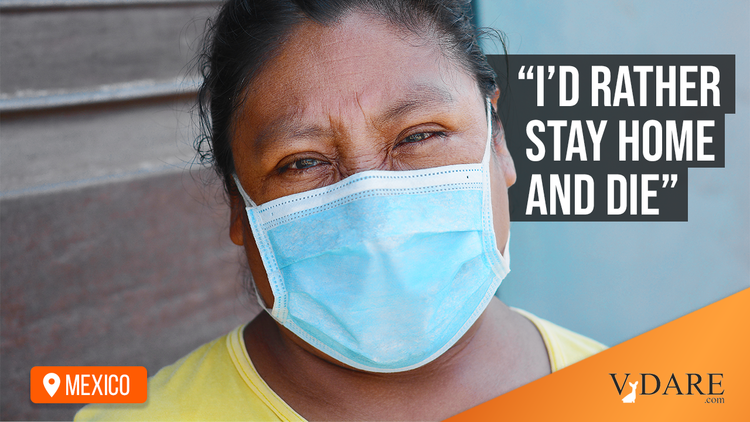
By Allan Wall
08/12/2020
Mexico now has the third-highest COVID-19 death count. Its death rate per million is 423 (511 in the United States).
The New York Times reports that there’s a mistrust of hospitals in Mexico that increases the death rate.
Mexico is battling one of the worst coronavirus outbreaks in the world, with more than 52,000 confirmed deaths, the third-highest toll of the pandemic. And its struggle has been made even harder by a pervasive phenomenon: a deeply rooted fear of hospitals. The problem has long plagued nations overwhelmed by unfamiliar diseases. During the Ebola epidemic in 2014, many in Sierra Leone believed that hospitals had become hopeless death traps, leading sick people to stay home and inadvertently spread the disease to their families and neighbors.
Here in Mexico, a similar vicious cycle is taking place. As the pandemic crushes an already weak health care system, with bodies piling up in refrigerated trucks, many Mexicans see the Covid ward as a place where only death awaits — to be avoided at all cost.
The consequences, doctors, nurses and health ministers say, are severe. Mexicans are waiting to seek medical care until their cases are so bad that doctors can do little to help them. Thousands are dying before ever seeing the inside of a hospital, government data show, succumbing to the virus in taxis on the way there or in sickbeds at home. ['I'd rather stay home and die' by Natalie Kitroeff and Paulina Villegas, New York Times, August 10, 2020]
In Mexico, the COVID-19 rate may be higher than reported.
Fighting infections at home may not only spread the disease more widely, epidemiologists say, but it also hides the true toll of the epidemic because an untold number of people die without ever being tested — and officially counted — as coronavirus victims.
The coronavirus death rate in hospitals is high.
Many Mexicans say they have good reason to be wary of hospitals: Nearly 40 percent of people hospitalized with confirmed cases of the virus in Mexico City, the epicenter of the nation’s outbreak, end up dying, government data show, a high mortality rate even when compared with some of the worst coronavirus hot spots worldwide. During the peak of the pandemic in New York City, less than 25 percent of coronavirus patients died in hospitals, studies have estimated.
While the statistic may be imprecise because of limited testing, doctors and researchers confirmed that a startling number of people are dying in Mexico’s hospitals.
During a surge of cases in May, almost half of all Covid-19 deaths in Mexico City hospitals occurred within 12 hours of the patient’s being admitted, said Dr. Oliva López Arellano, Mexico City’s health minister. In the United States, people who died typically made it five days in the hospital.
Doctors say more patients would survive if they sought help earlier. Delaying treatment, they argue, simply leads to more deaths in hospitals — which then generates even more fear of hospitals.
As I've reported before (here and here) there've been attacks on medical personnel in Mexico.
The distrust is so pronounced that relatives of patients in Ecatepec, a municipality outside Mexico City, stormed a hospital in May, attacking its employees, filming themselves next to bags of corpses and telling reporters that the institution was killing their loved ones.
“After seeing videos of what happens to people inside hospitals, screw that,” said Mr. Bailón’s brother, José Eduardo, who had recently spent 60 days at home recovering from his own bout with what he believes was the coronavirus. “I’d rather stay home and die there.” ["Mr. Bailon" is referring to a person who died of coronavirus, mentioned earlier in the article.]
But many people who die at home in Mexico — or even on the way to the hospital — are never tested for the virus, so they are not counted as coronavirus victims. Instead, they fall into a statistical black hole of fatalities that are not officially tied to the pandemic.
Even by the official count, Mexico has already suffered more coronavirus deaths than any other nation but the United States and Brazil. And the government said recently that during a period of over three months this spring, there were 71,000 more deaths than expected, compared with previous years — an indication that the virus has claimed many more lives than the official tally suggests.
Once again, the mystery about the official tally.
Nearly 70 percent of Mexicans said they would feel “unsafe” taking their loved ones to the hospital during the pandemic, in a survey published last month. A third said they would prefer to care for their relatives themselves.
That’s a big percentage who feel that way.
Now the nation’s top health officials have begun pleading with Mexicans to stop resisting medical care.
“It’s very important that late care doesn’t contribute to death,” Hugo López-Gatell, the health official leading the country’s response to the virus, said at a news conference last month. “Please, go to hospitals early, especially people who are most at risk.”
Lopez-Gatell, of whom I've written before, earned his Ph.D in epidemiology from Johns Hopkins University.
Many are wary of the costs that come with a hospital stay. And in a country plagued by rampant government corruption, the fundamental distrust of the authorities often extends to doctors and nurses in public hospitals.
This is a content archive of VDARE.com, which Letitia James forced off of the Internet using lawfare.